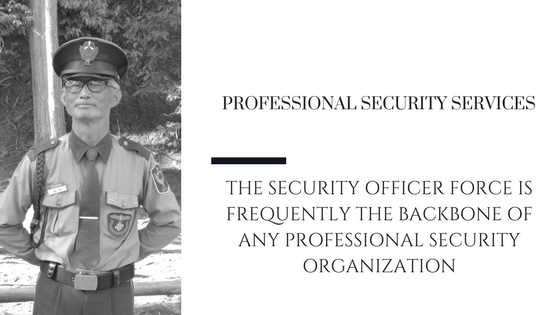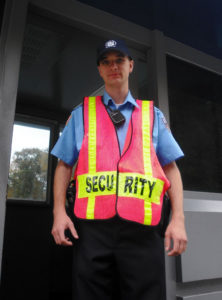Selecting Professional Security Services
The security officer force is frequently the backbone of any professional security organization. Every security manager is faced with the task of determining the best source and approach for staffing and management of this force. Contract security agencies provide the promise of flexible staffing options, experienced management, extensive training, detailed selection and recruiting, professional officers and more. How many contract vendors truly deliver on this promise? How do you ensure that the vendor you select is in a position to provide the service you require?
Professional Security Who Determines the Vendor Focus
A successful professional security program will be based on paying attention to factors specific to each individual client. Generic training programs will not prepare the vendor’s officers for work at your site. Broad scope recruiting and hiring standards will not result in officers assigned to your site that truly have the skill sets and personality to fit your needs. Policies and Procedures set forth by the vendor may not provide the foundation necessary for success at your location.

Developing a professional security program for your business is a complex process. At every stage of this development, consideration must be given to the unique qualities of your location and how each of the vendor’s actions lead towards catering to these needs. Vendors have designed training programs, selection standards, recruiting plans, operating procedures and more. The goal is to improve efficiency and effectiveness of their security programs.
The problem lies in the fact that this is virtually the definition of the “One Size Fits All” mentality. If the vendor implements a physical ability criteria, they may eliminate a potential officer that would fit your needs if your site does not have strenuous physical needs. Conversely, failure to take physical fitness into account can negatively impact the ability of their officers to perform adequately if your site does have duties that require the officers to be in good physical condition. The same concept holds true for many other areas. It is impossible for any training program to adequately prepare and individual for all possible duties and incident responses. As such, it is imperative that training programs are focused on areas that will most likely serve the officer in their current position. It is not feasible to develop a single program that achieves this for all officers on all assignments.
Once again, initiating and managing an effective security program is a complex endeavor. Every action by the vendor must be directed at taking the best course of action for your business. As a result, the company template for recruiting, hiring, staffing, training, management, and operations must be specifically tailored for your organization. Anything less than full customization is a recipe for failure.
Warning Signs
When you are meeting with your current or a potential vendor, look for signs of the “One Size Fits All” mentality. Obviously every vendor will have their reasons for why they believe they are better than the rest. Let them explain this to you. However if they begin talking about their programs, that is a sure sign they do not understand the value of the Fully Customized Security Program.
- Let me tell you about OUR training program.
- We have established selection standards to ensure the best people are assigned to your site.
- We have instructed all of our people to ___________.
- Our managers focus on _______________.
We all want the security vendor to have a plan. However, this plan must be focused on achieving the goals for your location. If the vendor begins talking about how the operate, prior to learning how you operate, you have a problem. Whenever a vendor is making a statement along these lines, ask yourself:
“Is this catered to providing the best service for me,
or focused on ease of operation for the vendor?”
Once you are aware of the warning signs, the next step is to make sure the vendor is truly partnering with you to create a program specific to your needs.
Recruiting and Selection Professional Security Services
All of the training, policies and procedures and management responses are not enough to overcome the problem of placing the wrong person in the wrong position. It is important to remember we are not dealing with machines. These are people. Individuals are capable of making mistakes, even misrepresenting themselves. As such there is no cure-all for finding the right person. However, it is imperative that the efforts of the vendor are focused on finding and assigning people who possess the required skill sets and personality to fit into your operation.
Before moving too far in the process of developing your security program with the vendor, identify key requirements and create a job description for each position you will require. This job description can include, but is not limited to, any of the following as allowed by law:
- Education requirements
- Physical requirements (lifting, walking, etc.)
- Experience requirements
- Medical training requirements
- Availability requirements
- Computer aptitude
- Job specific training requirements
- Minimum age requirements
In addition to minimum requirements, the vendor should be aware of the personality and approach to security you expect from personnel assigned to your business.
Professional Security Training
In my career, I have seen many good people fail as security officers simply because they did not know how to do their jobs. They possessed all the skills, personality traits and drive to excel, but did not possess the knowledge required for the position. I have seen good officers make poor decisions when trying to determine the best course of action when presented with an incident in which they had not been trained in the proper handling.
Each state has different minimum training standards. The State of Minnesota, for example requires twelve (12) hours of preassignment training and six (6) hours of continuing training each year after. This is obviously insufficient to prepare the individual for work as a security officer. Additional training will be needed.
When the vendor creates a training program to further the education of the employee, you as a user, should ask “How does this training prepare the officer for work at my site?” If the training the officer receives is related to CCTV operation and monitoring, but your site does not have any cameras, nothing of substantial value to you has been taught.
Partner with the vendor. Ensure there is adequate continuing training provided, and that the course work taught is focused on areas of study pertinent to your location.
Professional Security Management
One of the factors that distinguishes one company from another, separates the good vendors from the bad, is the quality of the managers, especially the one assigned to your account. The hope is that when you hire a security vendor, the manager for your account is a security professional and can provide insight and leadership in directing your security program. Unfortunately this is not always the case.
Beyond questioning hiring practices, training, and operating policies, question and interview the manager that would be assigned to your account. Make sure there is a sufficient knowledge base and that the personality is conducive to a future partnership. Remember this person is potentially going to walk step by step with you in designing and managing your security program. You want to be comfortable in them as a person, and as a security expert.
Beyond determining who would be your manager, you want to explore management practices and potentially set forth some ground rules. Some clients want frequent contact. Some what to be left alone. Some prefer email, while yet others will settle for nothing less than face to face meetings. It is not uncommon for a relationship to fail, simply because the manager was unable to determine the true needs of the client. Don’t make them guess. Tell them exactly what you expect
- Explore the manager’s security background. Beware of career managers, that have simply found their way into security.
- Evaluate management style and personal interaction.
- Make sure you have a comfort level with the manager
- Clearly outline your expectations. Any resistance to these expectations is a serious “red flag”.
Professional Security Procedures and Policies
All too frequently, vendors have already determined many policies and procedures that encompass all of their officers, prior to even speaking with the potential client. Vendors frequently choose what is safe for them from a liability standpoint, or what their officer pool is capable of handling.
Scenario
A property management firm is hired to run a urban mall located in a downtown environment. In addition to some retail outlets, the center houses a hotel and numerous establishments serving alcohol.
The management firm initially wanted a security staff capable of handling the undesirables that were to be expected in an urban setting. The client wanted officers trained in use of force, as well as alternatives dealing with handling disruptive persons.
The vendor insisted the best role for the security department was to serve in a preventative role as opposed to a response role. The continued to imply that incident response was best handled by the police.
This made sense to the client. Unfortunately the client was mislead by clever language. What the vendor had done is ensure his staff would not be handling any volatile situations. While this was a definite plus for the vendor, the client was forced to stand by as incidents that could have been handled quickly by the security staff they had paid for, continued to disrupt the mall as they waited for police response.
In this scenario, based on a true account, the vendor already had preconceived notions as to how security is to be performed at all accounts. Unfortunately in this case, the approach was not what was best suited to the client’s needs. The same problem presents itself on the opposite end of the spectrum, where some vendors insist on a high profile, proactive approach, when a more subtle presence is appropriate.
Ideally you will find a vendor that is understanding of your needs, and will adjust the program to suit those needs. If this is not an option, ensure you select a vendor whose vision of security, parallels the needs of your site.
Professional Security Pay Rates
Wage rates, above all else, are the greatest cost concern when developing a security program. The best way to control security costs, is to limit wage rates. Before doing so however, it is important to examine the needs of your program in terms of salary for officers, and ensure the selected pay rate affords you the opportunity to recruit and retain quality personnel.
There are two approaches to take in determining the appropriate wage level for officers assigned to your site. First is to take a look at your geographic market. Market information is typically available from the Department of Labor. This will provide you with a wide range of wage data, both for the security profession, and other comparable professions. The second approach is to simply consider the contract companies recruiting base. Taking into account this recruiting base, do you want the best the company has to offer? If so, you will want to be at the top of their pay scale. If falling into the middle is acceptable to you, a middle of the road pay scale will work.
Regardless of how you evaluate pay scales, it is important to remember the job you are asking the officers to do. You want to ensure the pay rate selected affords the contact agency the ability to attract and retain quality personnel. In many cases, security officers are paid in line with custodial workers. In most circumstances the duties and responsibilities you will assign to security personnel will be far greater and require a greater professionalism than those you assign to your cleaners. It is only logical that you will want to pay more to the security personnel in an effort to attract quality personnel capable of protecting your property and people.
Professional Security Bill Rates
Security pricing, when done by true professionals, is actually nothing more than execution of a formula. While it is a complex and intricate formula, it is none the less a mathematical equation. The vendor simply totals real costs, estimated costs, and profit expectations into a bill rate.

Real Costs
Hourly Wage
- Payroll Taxes
- GL Insurance
- Vacation Costs
- Holiday Costs
- Worker’s Comp Insurance
- Other Taxes/Insurance
- Commissions
Estimated Costs
The vendor must then estimate these costs and include them into the bill rate. The problem here lies in that none of these are truly definable costs. No one is sure until the end of the year, how much overtime will be used. No one knows for sure what turnover will be and what costs dependent upon that factor will total.
- Overtime
- Training Costs
- Uniform Costs
- Recruiting Costs
- Hiring Costs
- Company Overhead
- Employee Benefits
The next step is to take all of these costs into consideration, and then look at the proposed bill rate. This will leave you with the anticipated profit the vendor hopes to achieve. We all understand that the vendor is in business to make money. That is the purpose of the business. However, if one vendor is charging $24.00 per hour and is investing $12.00 per hour into the product, while another vendor is charging $25.00 per hour, but investing $18.00 per hour into the product, which is a better value. It is imperative that you analyze the cost breakdown to see what you are truly getting. Take into account base wage, training costs, even quality of uniform will result in costs.
The easy way to do this is to look at the mark up or percentage of the bill rate that is passed onto the officers in the form of salary. If you were to read a textbook on running a security company, it would most likely give the number of 67%. This means 67% of the bill rate should be passed onto the officers. A $15.00 bill rate would result in the officer being paid at $10.00 per hour. This leaves 23% for company expenses and 10% for profit. Assuming all goes to plan for the company. Be aware that for smaller companies, maintaining the 67% ratio is frequently impossible as their costs per hour of service are typically higher. However, if this number falls into the 50%-55% range, or even lower, the vendor is most likely taking exorbitant profit.
Officer Pay Rate / Bill Rate = Percentage
This simple formula will allow you to judge whether the bill rate proposed is fair, or slanted towards excessive profits.
Summary
You want to ensure you are getting a quality professional security program that will meet or exceed your needs. You want to get it at a fair price. You want a company that will partner with you in developing this program. You want officers that are competent and capable. You want your personnel to be sufficiently trained. You want a recruiting professional security program that will provide a quality officer base, and allow for replacement of departing officers. You want a vendor management team that is knowledgeable in security and committed to your program.
This may sound like a lot to ask, but in reality it is not. All you are asking for is a good product at a fair price. This is not too much to ask in any other industry, why is security different? Ask the right questions. Be a knowledgeable consumer. You will be able to find the right fit.









